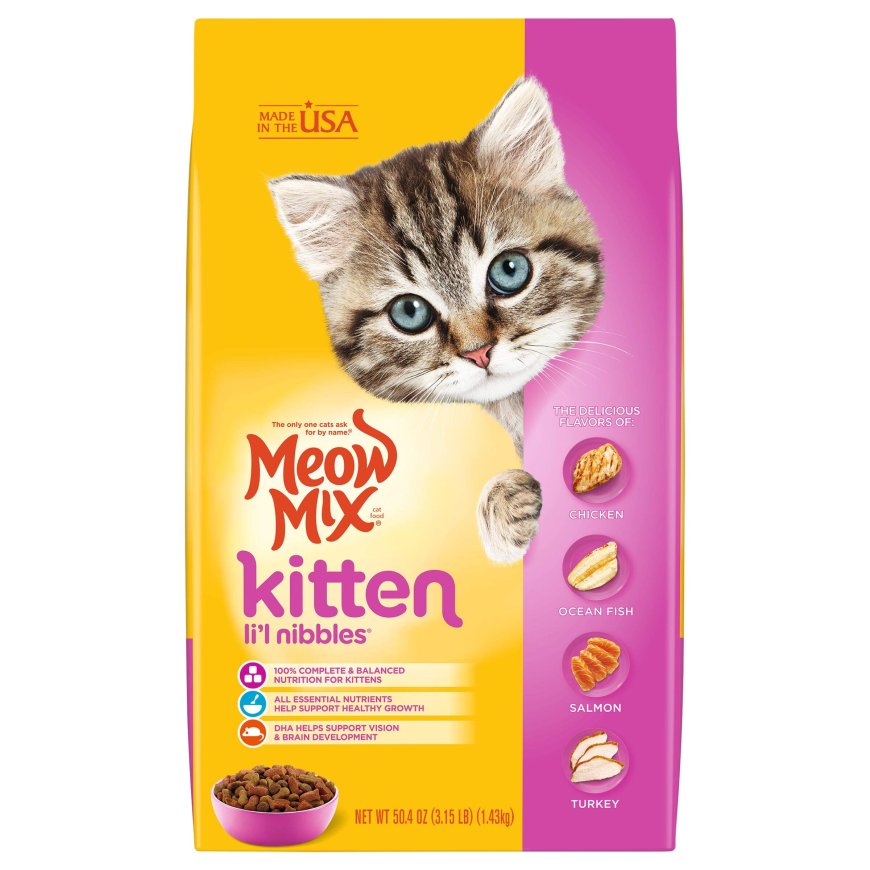Unveiling the Health Benefits of Kitten Food: A Comprehensive Guide
Kitten food is high in calories to satisfy their increased energy needs while keeping them occupied and active all day.

Introduction:
Welcoming a kitten into your home is an exciting and rewarding experience. As a responsible pet owner, providing your new furry friend with the best nutrition is paramount for their health and development. One of the key aspects of ensuring optimal feline nutrition is feeding them a diet specifically formulated for kittens. In this comprehensive guide, we delve into the benefits of kitten food, exploring why it's essential for your young cat's well-being and addressing common questions that arise when choosing the right diet for your feline companion.
Understanding Kitten Food:
Kitten food is specially formulated to meet the unique nutritional needs of growing cats. Unlike adult cat food, which may not provide adequate nutrients for kittens' rapid growth and development, kitten food is enriched with higher levels of protein, essential vitamins, minerals, and amino acids crucial for their overall health.
Benefits of Kitten Food:
- Essential Nutrition:
Kitten food is designed to provide a balanced and complete diet tailored to the specific requirements of growing cats. It contains higher levels of protein, which is essential for muscle development, as well as vitamins and minerals that support overall growth and vitality. - Healthy Growth and Development:
The first year of a kitten's life is crucial for their growth and development. Kitten food supports healthy bone formation, strong muscles, and optimal brain development, laying the foundation for a healthy adult cat. - Immune System Support:
Kittens have developing immune systems that require extra support to fend off diseases and infections. Kitten food is fortified with antioxidants and immune-boosting nutrients like vitamin E, vitamin C, and zinc to help strengthen their immune defenses. - Digestive Health:
Kittens may have sensitive stomachs, making it important to feed them easily digestible food. Kitten food is formulated with high-quality ingredients that are gentle on their digestive system, reducing the risk of gastrointestinal issues like vomiting and diarrhea. - Dental Health:
Proper dental care is essential for cats of all ages. Kitten food may contain specially shaped kibble or ingredients that help promote dental health by reducing plaque and tartar buildup, ensuring your kitten maintains healthy teeth and gums. - Energy Requirements:
Kittens are naturally playful and energetic, requiring a diet that provides the necessary fuel for their active lifestyle. Kitten food is calorie-dense to meet their higher energy needs, helping them stay active and engaged throughout the day.
Conclusion:
In conclusion, feeding your kitten a diet specifically formulated for their nutritional needs is essential for promoting optimal health and well-being. Kitten food provides essential nutrients, supports healthy growth and development, strengthens the immune system, promotes digestive health, and ensures your young cat has the energy to thrive. By choosing high-quality kitten food and following feeding guidelines, you can lay the foundation for a lifetime of good health for your furry friend.
FAQs (Frequently Asked Questions):
How long should I feed my kitten kitten food?
Kittens should typically be fed kitten food until they reach around one year of age. After that, you can gradually transition them to adult cat food.
Can I feed my kitten adult cat food instead of kitten food?
It's not recommended to feed kittens adult cat food as it may not provide the necessary nutrients for their growth and development.
How often should I feed my kitten kitten food?
Kittens should be fed kitten food several times a day, with meals spaced out evenly to meet their energy needs.
Should I choose wet or dry kitten food?
Both wet and dry kitten food can be suitable options, but it's essential to choose a high-quality food that meets your kitten's nutritional requirements.
Can I mix kitten food with adult cat food?
It's best to avoid mixing kitten food with adult cat food, as they have different nutrient profiles. Stick to feeding your kitten a diet formulated specifically for their needs.
How do I know if my kitten is getting the right nutrients from their food?
Look for signs of healthy growth and development, including a shiny coat, bright eyes, and steady weight gain. Regular veterinary check-ups can also help ensure your kitten is receiving adequate nutrition.
Should I consult my veterinarian before choosing a kitten food?
Yes, it's always a good idea to consult with your veterinarian before selecting a kitten's food to ensure it meets your kitten's specific nutritional needs and any unique health considerations.
Are there any ingredients I should avoid in kitten food?
Avoid kitten foods with excessive fillers, artificial preservatives, and low-quality protein sources. Look for labels that indicate the food is formulated for kittens and meets AAFCO (Association of American Feed Control Officials) guidelines for growth.












